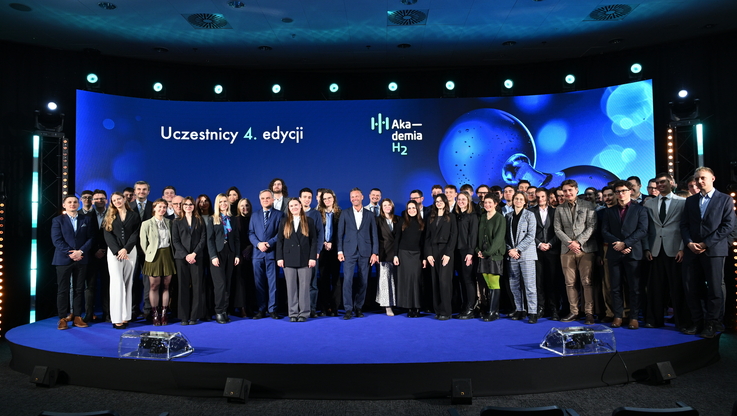Pobierz materiał i Publikuj za darmo
Contracted by the European Commission, the study found that Poles were among the societies with the strongest belief in the good intentions of the broadly defined EU bureaucracy. Comparable levels of trust in EU institutions were recorded in Ireland (74 percent), Portugal (74 percent), Denmark (71 percent), Luxembourg (75 percent), Finland (71 percent) and Malta (72 percent).
Notably, all these countries showed stronger approval – in some cases by a large margin – for Community authorities than the largest of the EU15 states, i.e. Germany (65 percent), Italy (56 percent) and France (53 percent).
Eurobarometer’s survey involved more than 62,000 phone interviews conducted in September and October 2021 across 27 Member States, divided into 194 regions. The regional division in Poland was based on the existing voivodships (provinces), excluding Warsaw and its neighbouring communes in Mazovia.
And it is Warsaw that proved to be Europe’s second – after Helsinki, Finland – region in terms of trusting EU institutions (78 percent responses). This trust was shared by more than 70 percent of residents in the Pomeranian, Kuyavian-Pomeranian, Warmian-Masurian, Opole, Lubusz, Westpomeranian, Greater Poland, Lublin and Łódź Voivodships.
Respondents in the Subcarpathian, Lesser Poland, Podlasie, Świętokrzyskie, Mazovian, Silesian and Lower Silesian Voivodeships were slightly more sceptical, although in none of these regions did EU trust levels fall below 66 percent.
As explained by Wiktor Szydarowski – a Polish academic leading an ESPON research project concerned with the differences between European regions – there is a number of factors underlying levels of trust in the EU, and they vary between communities.
“The coronavirus pandemic, and before that the financial crisis, worsened regional disparities, particularly between eastern and western, as well as northern and southern, regions. So, the way people in individual regions feel about the EU is only partly attributable to their perception of how the EU functions. The decisive factors are economic safety and standard of living, and these largely depend on domestic policies and historical backgrounds,” explained the ESPON project leader.
The expert has mentioned Germany as an example – their 65-percent level of trust in the EU is driven primarily by affluent states in the west of the country. Indeed, the figure for less-developed states from the former German Democratic Republic oscillated around 50 percent.
Warsaw's standard of living – for instance, in terms of GDP measured at PPP – is on par with the most developed regions of Western Europe. Consequently, its residents have an overall more positive perception of the recent years, and by extension, a more favourable view of how the EU structures – influencing the everyday lives of each Community citizen – function.
The study also asked the respondents to give their assessment of how the EU had handled the coronavirus pandemic. Overall in the EU, 57% of the respondents expressed their approval in this regard, while 40% were of a contrary opinion. There were also regional differences – the highest satisfaction levels were found in Northern European areas (Scandinavia, Ireland, Benelux), whereas the citizens of southern states (Spain, Italy, Greece) were more sceptical.
All Polish regions had a more or less favourable view of how the Community had handled the pandemic, including most notably the Warsaw agglomeration and the Greater Poland Voivodship (71 percent of responses each). The smallest difference between the number of citizens approving and disapproving the EU’s efforts against the coronarvirus was noted in the Subcarpathian Voivodeship (52 vs. 42 percent, respectively).
EU climate policy was the subject that Europeans disagreed about the most. Eurobarometer’s experts asked the following question: how effective or not will the European Green Deal be in helping to tackle the challenges facing the EU?
A total of 47 percent of the respondents thought that these efforts were effective and purposeful, while 46% believed to the contrary. However, the proportions between the sentiment expressed by residents of individual regions were not distributed equally.
“The attitude towards the EU’s environmental goals is critically influenced by how much specific regions are exposed to the potential effects of climate change, possibly making them less attractive to residents and tourists. These phenomena cause the outflow of the younger population, depleting the human and social capital of regions and countries, driving down their entrepreneurship and innovation, and having an adverse impact on their overall economic performance,” said Wiktor Szydarowski.
Hence the very high support levels for the European Green Deal in Alpine states (melting glaciers) and the Netherlands (which is at risk of sea and ocean level rise). Economic factors, however, play a significant role as well, relating primarily to the effects of moving away from coal-heavy regions in Germany, the Czech Republic and Poland.
In Poland a total of 50.2 percent of the respondents had a favourable view of the EU’s climate goals, while 41.3 percent thought to the contrary. The highest levels of support for the European Green Deal were found in the Greater Poland (58 percent approval vs. 34 percent disapproval), Opole (57 percent vs. 37 percent) and Westpomeranian (54 percent vs. 36 percent) Voivodeships.
At the opposite end of the spectrum are the Lublin (46 percent approval vs. 43 percent disapproval) and Podlasie (47 percent approval and disapproval) Voivodeships. In the Mazovian Voivdeship (excluding Warsaw), the majority of the respondents were sceptical of the EU’s climate policy (51 percent disapproval).
The full study is available here.
Source: PAP MediaRoom
Pobierz materiał i Publikuj za darmo
bezpośredni link do materiału
| Data publikacji | 29.11.2021, 15:53 |
| Źródło informacji | PAP MediaRoom |
| Zastrzeżenie | Za materiał opublikowany w serwisie PAP MediaRoom odpowiedzialność ponosi – z zastrzeżeniem postanowień art. 42 ust. 2 ustawy prawo prasowe – jego nadawca, wskazany każdorazowo jako „źródło informacji”. Informacje podpisane źródłem „PAP MediaRoom” są opracowywane przez dziennikarzy PAP we współpracy z firmami lub instytucjami – w ramach umów na obsługę medialną. Wszystkie materiały opublikowane w serwisie PAP MediaRoom mogą być bezpłatnie wykorzystywane przez media. |





